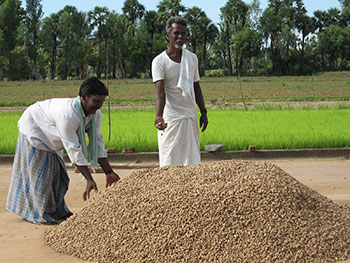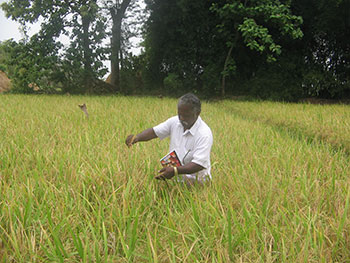BACKGROUND TO THE PROJECT
CIKS has been working with a vision of utilization of indigenous knowledge and resources for sustainable growth in agriculture. Our intervention has the following components namely,
-
Local level intervention of technical nature
-
Creating an enabling larger environment
-
Organisational support
-
Towards formulation of a state policy supportive of organic agriculture
Towards creating an enabling larger environment for organic agriculture we have been working towards a supply chain for organic inputs which includes good quality seeds, green manure seeds, biofertilisers, biopesticides, neem seed cake and compost. CIKS has been providing support and hand holding for farmers, over coming problems faced during periods of transition such as dip in yield and decreased returns. In our effort to work towards supply chain for inputs we have largely succeeded in making farmers self reliant with most of the inputs except good quality organically cultivated and certified seeds.
WORK DONE UNDER THIS PROJECT
With support from Cottonwood Foundation we have achieved the following:
-
100 farmers have been selected from Kancheepuram and Nagapattinam district covering 100 acres for paddy seed production.
-
Indigenous paddy seeds have been procured for the farmers and distributed through the project.
-
Farmers have cultivated seeds completely organically and have been registered for organic certification following the Internal Control Systems (ICS for group certification).
 |
| Freshly harvested groundnut of Mr. Arjunan's field |
-
Farm registration and field inspections have been completed and the crop has been harvested.
-
The paddy seeds after harvest have been stored in godown and is ready for processing. For the first time farmers have produced organically cultivated paddy and groundnut seeds which will also be certified by the Government Seed Certification Department and the price that the farmers get will be 10% more than the regular varieties.
-
Based on the trainings that have been given for farmers they have sown paddy seeds in nearly 100 acres for the current season also.
 |
| Mr. Jayapal doing roguing in seed production training |
-
Besides the regular varieties promoted by the Government departments farmers have also undertaken seed production of indigenous varieties like Seeraga samba, Sembili pinni, Pisini and Mappillai samba. All these would be certified by the Certification Department by May 2010.
-
A community owned seed processing unit with a 500 sq.ft. construction for housing the seed grader, cleaner and a threshing yard have been constructed. Funds for these have been raised from other sources.
-
Training with respect to certified seed production was provided to the staff involved in monitoring farmers fields.
-
We have provided trainings for farmers with respect to seed production techniques, registration of the seed farm, inspection formalities, processing and cleaning, labeling and seed inspection. As a part of seed production training farmers were also provided trainings on SRI techniques.
.jpg) |
| Traditional Paddy Fields |
Benefits from the project
-
Farmers have been trained and encouraged to take up the activity of seed production which will fetch them more income than regular grain production.
-
In addition to this, farmers will also get access to good quality seeds.
-
A community of farmers in Tamil Nadu have produced organically certified paddy seeds for the first time.
Ways in which the funding from Cottonwood Foundation has made a difference
-
A good genetic pool of indigenous paddy varieties conserved by the farmers are now being disseminated to a large community of farmers by cultivating them as seeds.
-
The seed grant obtained from Cottonwood Foundation has also helped us convince other donors to give us grants for establishing community based facilities for seed processing. This will help the activity become sustainable in the long run.
|